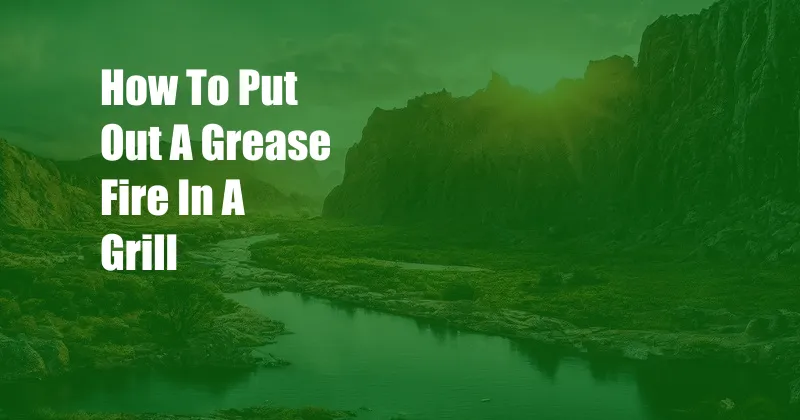
How to Extinguish a Grease Fire in a Grill: A Comprehensive Guide
Summers are synonymous with grilling and barbecues. While grilling is a fantastic way to enjoy delicious meals with friends and family, it’s crucial to be aware of the potential for grease fires. Grease fires can escalate rapidly, posing significant hazards. It’s essential to understand the proper techniques for extinguishing these fires safely and effectively to prevent accidents.
In this comprehensive guide, we’ll delve into the causes of grease fires, explore effective extinguishing methods, and provide tips and expert advice to help you handle such situations confidently. Whether you’re a seasoned grill master or just starting out, this article will equip you with the knowledge and skills you need to keep your grilling experiences safe and enjoyable.
Grease Fires: An Overview
Grease fires occur when cooking oil or other fats ignite, typically due to overheating. When grease is heated to its smoke point, it vaporizes and becomes highly flammable. If an ignition source is present, such as an open flame or hot surface, the vaporized grease can ignite, resulting in a rapid and intense fire.
Extinguishing a Grease Fire
1. Do Not Throw Water on the Fire: Water reacts violently with hot grease, causing it to splatter and spread the fire. Never attempt to douse a grease fire with water, as it can make the situation worse.
2. Smother the Fire: The most effective way to extinguish a grease fire is to smother it by cutting off its oxygen supply. Use a metal lid, cookie sheet, or baking tray to cover the fire completely. Leave it in place until the fire is extinguished and the grease has cooled down.
3. Baking Soda: Baking soda is an effective fire suppressant that can be used on small grease fires. Sprinkle it liberally over the fire to absorb the grease and smother the flames.
4. Fire Extinguisher: A Class B fire extinguisher is specifically designed to put out grease fires. If you have one readily available, follow the instructions on the extinguisher carefully.
Additional Tips and Expert Advice
1. Prevention is Key: The best way to avoid grease fires is to prevent them from happening in the first place. Clean your grill regularly to remove excess grease and food buildup. Avoid overfilling the grill with food, as this can cause grease to spill over and ignite.
2. Keep a Fire Extinguisher Nearby: Having a Class B fire extinguisher within easy reach is crucial in case of a grease fire. Ensure that everyone who uses the grill knows where it is located and how to use it properly.
3. Use a Grill Thermometer: Monitoring the temperature of your grill is essential to prevent overheating. Use a grill thermometer to ensure that the temperature does not exceed the recommended cooking temperatures for the food you are grilling.
Frequently Asked Questions
Q: Can I use salt to put out a grease fire?
A: No, salt is not an effective fire suppressant for grease fires. It can create a crust on the grease, trapping the fire beneath and making it harder to extinguish.
Q: What should I do if my clothes catch fire from a grease fire?
A: Stop, drop, and roll to extinguish the flames. Do not run, as this will fan the flames and make them worse.
Q: Can I grill on a dirty grill?
A: It is not advisable to grill on a dirty grill as the accumulated grease and food buildup can increase the risk of a grease fire.
Conclusion
Grease fires can be a hazardous situation, but by understanding proper extinguishing techniques and following safety precautions, you can minimize the risk of accidents and ensure a safe grilling experience. Implement the tips and advice outlined in this guide, and always remember: prevention is the best defense against grease fires.
Are you interested in learning more about grilling safety? Check out our other resources for additional tips and expert insights.